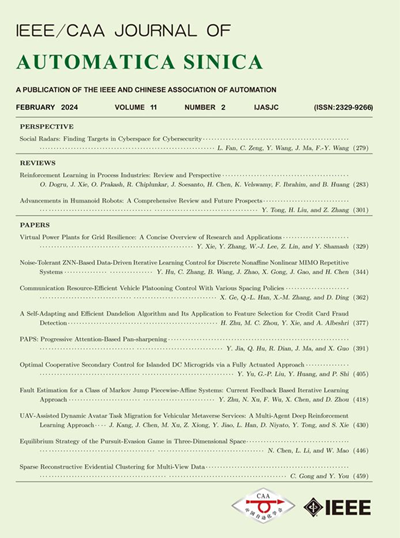Revisiting the LQR Problem of Singular Systems
IF 15.3
1区 计算机科学
Q1 AUTOMATION & CONTROL SYSTEMS
引用次数: 0
Abstract
In the development of linear quadratic regulator (LQR) algorithms, the Riccati equation approach offers two important characteristics —it is recursive and readily meets the existence condition. However, these attributes are applicable only to transformed singular systems, and the efficiency of the regulator may be undermined if constraints are violated in nonsingular versions. To address this gap, we introduce a direct approach to the LQR problem for linear singular systems, avoiding the need for any transformations and eliminating the need for regularity assumptions. To achieve this goal, we begin by formulating a quadratic cost function to derive the LQR algorithm through a penalized and weighted regression framework and then connect it to a constrained minimization problem using the Bellman's criterion. Then, we employ a dynamic programming strategy in a backward approach within a finite horizon to develop an LQR algorithm for the original system. To accomplish this, we address the stability and convergence analysis under the reachability and observability assumptions of a hypothetical system constructed by the pencil of augmented matrices and connected using the Hamiltonian diagonalization technique.重新审视奇异系统的 LQR 问题
在开发线性二次调节器(LQR)算法的过程中,里卡提方程方法具有两个重要特点--递归性和易于满足存在条件。然而,这些特性只适用于变换后的奇异系统,如果在非奇异系统中违反了约束条件,调节器的效率可能会受到影响。为了弥补这一缺陷,我们引入了一种直接解决线性奇异系统 LQR 问题的方法,无需任何变换,也无需正则性假设。为了实现这一目标,我们首先提出了一个二次成本函数,通过惩罚和加权回归框架推导出 LQR 算法,然后利用贝尔曼准则将其与受约束最小化问题联系起来。然后,我们采用动态编程策略,在有限视界内以逆向方式为原始系统开发 LQR 算法。为了实现这一目标,我们在可达到性和可观测性假设条件下,对由增强矩阵的铅笔构建的假定系统进行稳定性和收敛性分析,并利用哈密尔顿对角化技术将其连接起来。
本文章由计算机程序翻译,如有差异,请以英文原文为准。
求助全文
约1分钟内获得全文
求助全文
来源期刊

Ieee-Caa Journal of Automatica Sinica
Engineering-Control and Systems Engineering
CiteScore
23.50
自引率
11.00%
发文量
880
期刊介绍:
The IEEE/CAA Journal of Automatica Sinica is a reputable journal that publishes high-quality papers in English on original theoretical/experimental research and development in the field of automation. The journal covers a wide range of topics including automatic control, artificial intelligence and intelligent control, systems theory and engineering, pattern recognition and intelligent systems, automation engineering and applications, information processing and information systems, network-based automation, robotics, sensing and measurement, and navigation, guidance, and control.
Additionally, the journal is abstracted/indexed in several prominent databases including SCIE (Science Citation Index Expanded), EI (Engineering Index), Inspec, Scopus, SCImago, DBLP, CNKI (China National Knowledge Infrastructure), CSCD (Chinese Science Citation Database), and IEEE Xplore.
 求助内容:
求助内容: 应助结果提醒方式:
应助结果提醒方式:


